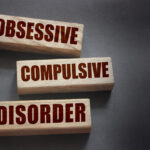According to the National Institute of Mental Health, Obsessive-Compulsive Disorder (OCD) affects 2-3% of the population across their lifetime. The disorder is characterized by a pattern of unwanted thoughts or fears (obsessions) that cause an individual to perform a set of repetitive behaviors (compulsions). OCD can interfere with a person’s daily activities and lead to significant distress. Being aware of the signs and symptoms of OCD can help individuals understand what they’re experiencing and whether to seek out professional treatment.
Updates and Resources
October Is a Time to Focus on Mental Health
October is a time for change – the air gets chilly, we unpack our sweaters, and we start looking ahead to the holidays. It is also a good time to take a pause and think about our well-being both mentally and physically. Is there anything that needs our attention? Are there habits or behaviors we should adjust to ensure we’re healthy and thriving? This October, Mental Illness Awareness Week, National Depression Screening Day, and World Mental Health Day all dovetail to promote the importance of mental health screenings while also reducing the stigma associated with mental health conditions.
5 Ways to Help Teens Cope with Anxiety
The teenage years are often met with a rollercoaster of emotions. Between hormones, school stress, and social pressures, this time can be a perfect storm for the development of mental health challenges, such as anxiety and depression. And with a new school year back in full swing, many teens may be struggling to juggle a variety of emotions, alongside their academic and extracurricular obligations. Fortunately, teens don’t have to navigate this rocky journey alone. With the help of family, friends, and therapy, teenagers can find ways to manage and cope with anxiety.
Why It’s Important to Talk About Suicide
Suicide was among the top nine leading causes of death in 2020 in the U.S., so it’s critical that we talk openly about it to help those impacted by suicide, and to prevent future incidents. Since everyone processes emotions and situations differently, the ways in which suicidal thoughts show up in a person can vary greatly. Being able to spot some of the ways that suicidal thoughts present themselves is the first step in prevention and getting a loved one the help they need.
Processing and Healing from a Loss Due to Overdose
The death of someone we care about is always a devastating loss and can be difficult to process. Losing someone to an overdose can add many more layers of complicated feelings such as guilt and stigma. Unfortunately, people who overdose or die from an overdose are often judged harshly, and those societal pressures can leave family and friends carrying that burden, alongside their grief. That’s why it’s so important to recognize International Overdose Awareness Day – “an annual campaign to end overdose, remember those who have died without stigma, and acknowledge the grief of those left behind.”
Recognizing Women’s Equality Day
Observed on August 26, National Women’s Equality Day acknowledges the continuous struggle for women’s participation and equality in all spheres of life and society. Yet it is also about uplifting and empowering women, and marveling at how far women have progressed, defying all odds and oppression. It is an opportunity to express gratitude for the influential women in our lives, to support local businesses run by women, and to celebrate womanhood.
Grief – a Journey Rather Than a Destination
Over the last few years, it has seemed that the world around us is full of grief. Whether it’s for the pre-pandemic world, a job, financial security, or the loss of a loved one, grief has become more of a collective experience. There is a lot of advice out there on how to “handle” or “manage” grief, with the idea that it’s something with a finite conclusion. But the reality is that grief is not something that goes away with time. Rather, it’s an experience that morphs and changes over time. Perhaps it’s more helpful to think of grief as a journey, rather than a destination.
Screen Time Affects Your Mental Health. Here’s How to Cope
While screen time can be enjoyable, studies have suggested that it can take a toll on our emotions. Social media in particular, can wreak havoc with our mental health. However, it is possible to use your digital devices without your mental health suffering. Like many things in life, it’s about setting boundaries, working toward balance, and practicing moderation. Here are a few ideas to consider.
Sunstone Applauds Launch of 988 Hotline for Mental Health Emergencies
We applaud the nationwide launch of the 988 Suicide & Crisis Hotline on July 16. 988 has been designated as the simplified three-digit dialing code that will route callers to the National Suicide Prevention Lifeline, connecting callers to trained counselors 24/7 for free. While 988 is not a new number, it was previously only accessible in certain parts of the U.S., so this marks the first time it will be available nationwide.
Understanding Race-Based Stress
When it relates to mental health, terms such as “trauma-informed care” are now part of the lexicon in supporting youth and vulnerable populations. Various types of trauma can affect everyone differently and can have profound negative emotional, mental, and physical effects on the brain and body. One focus area in trauma-informed care at Sunstone Counseling is race-based stress, which are symptoms that individuals experience after being exposed to distressing or life-threatening experiences, such as systemic racism or discrimination.
7 Reasons to See a Sunstone Graduate Intern
At Sunstone Counseling, one of our core tenets is to continually give back to the counseling profession. Through our graduate counseling and social work practicum/internship program, we strive to alleviate some of the barriers that individuals in the surrounding communities may face when seeking services. These barriers include but are not limited to: lack of insurance, lack of flexibility, financial limitations, and the lack of convenience. Sunstone’s graduate interns offer services at reduced rates, with flexible hours, and in multiple locations.
Understanding PTSD: You Are Not Alone
Post traumatic stress disorder (PTSD) is a psychiatric disorder that can originate from experiencing or witnessing any number of frightening or distressing events, such as a serious accident, a natural disaster, combat or a violent assault, or personal abuse or harassment. If you’re living with PTSD, you may feel as though you’re destined to deal with these symptoms forever. But treatment is possible, and you do not have to bear this burden alone.












